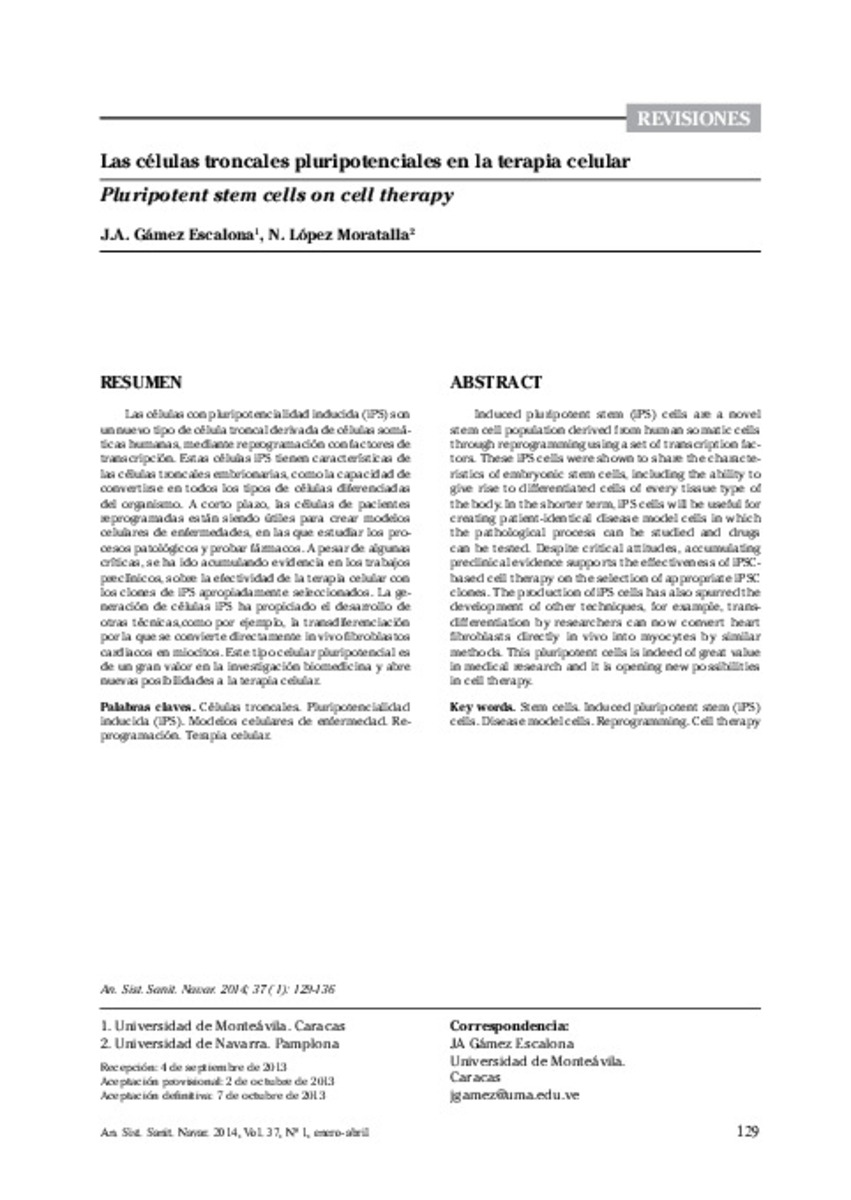Full metadata record
| DC Field | Value | Language |
|---|---|---|
| dc.creator | Gámez-Escalona, J.A. (J.A.) | - |
| dc.creator | Lopez-Moratalla, N. (Natalia) | - |
| dc.date.accessioned | 2023-02-17T12:35:16Z | - |
| dc.date.available | 2023-02-17T12:35:16Z | - |
| dc.date.issued | 2014 | - |
| dc.identifier.citation | Gámez-Escalona, J.A. (J.A.); Lopez-Moratalla, N. (Natalia). "Las células troncales pluripotenciales en la terapia celular". Anales del Sistema Sanitario de Navarra. 37 (1), 2014, 129 - 136 | es |
| dc.identifier.issn | 1137-6842 | - |
| dc.identifier.uri | https://hdl.handle.net/10171/65499 | - |
| dc.description.abstract | Las células con pluripotencialidad inducida (iPS) son un nuevo tipo de célula troncal derivada de células somáticas humanas, mediante reprogramación con factores de transcripción. Estas células iPS tienen características de las células troncales embrionarias, como la capacidad de convertirse en todos los tipos de células diferenciadas del organismo. A corto plazo, las células de pacientes reprogramadas están siendo útiles para crear modelos celulares de enfermedades, en las que estudiar los procesos patológicos y probar fármacos. A pesar de algunas críticas, se ha ido acumulando evidencia en los trabajos preclínicos, sobre la efectividad de la terapia celular con los clones de iPS apropiadamente seleccionados. La generación de células iPS ha propiciado el desarrollo de otras técnicas,como por ejemplo, la transdiferenciación por la que se convierte directamente in vivo fibroblastos cardiacos en miocitos. Este tipo celular pluripotencial es de un gran valor en la investigación biomedicina y abre nuevas posibilidades a la terapia celular. | es_ES |
| dc.description.abstract | Induced pluripotent stem (iPS) cells are a novel stem cell population derived from human somatic cells through reprogramming using a set of transcription factors. These iPS cells were shown to share the characteristics of embryonic stem cells, including the ability to give rise to differentiated cells of every tissue type of the body. In the shorter term, iPS cells will be useful for creating patient-identical disease model cells in which the pathological process can be studied and drugs can be tested. Despite critical attitudes, accumulating preclinical evidence supports the effectiveness of iPSCbased cell therapy on the selection of appropriate iPSC clones. The production of iPS cells has also spurred the development of other techniques, for example, transdifferentiation by researchers can now convert heart fibroblasts directly in vivo into myocytes by similar methods. This pluripotent cells is indeed of great value in medical research and it is opening new possibilities in cell therapy. | es_ES |
| dc.language.iso | spa | es_ES |
| dc.rights | info:eu-repo/semantics/openAccess | es_ES |
| dc.subject | Células troncales | es_ES |
| dc.subject | Pluripotencialidad inducida (iPS) | es_ES |
| dc.subject | Modelos celulares de enfermerdad | es_ES |
| dc.subject | Reprogramación | es_ES |
| dc.subject | Terapia celular | es_ES |
| dc.subject | Stem cells | es_ES |
| dc.subject | Induced pluripotent stem (iPS) | es_ES |
| dc.subject | Disease model cells | es_ES |
| dc.subject | Reprogramming | es_ES |
| dc.subject | Cell therapy | es_ES |
| dc.title | Las células troncales pluripotenciales en la terapia celular | es_ES |
| dc.title.alternative | Pluripotent stem cells on cell therapy | es_ES |
| dc.type | info:eu-repo/semantics/article | es_ES |
| dc.publisher.place | Pamplona | es_ES |
| dc.description.note | CC BY NC | es_ES |
| dc.identifier.doi | 10.4321/s1137-66272014000100014 | - |
| dadun.citation.endingPage | 136 | es_ES |
| dadun.citation.number | 1 | es_ES |
| dadun.citation.publicationName | Anales del Sistema Sanitario de Navarra | es_ES |
| dadun.citation.startingPage | 129 | es_ES |
| dadun.citation.volume | 37 | es_ES |
| dc.identifier.pmid | 24871118 | - |
Files in This Item:
Statistics and impact
Items in Dadun are protected by copyright, with all rights reserved, unless otherwise indicated.






